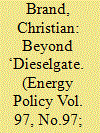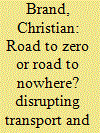|
|
|
Sort Order |
|
|
|
Items / Page
|
|
|
|
|
|
|
| Srl | Item |
| 1 |
ID:
150018


|
|
|
|
|
| Summary/Abstract |
The ‘Dieselgate’ emissions scandal has highlighted long standing concerns that the performance gap between ‘real world’ and'official’ energy use and pollutant emissions of cars is increasing to a level that renders ‘official’ certification ratings virtually ineffective while misleading consumers and damaging human health of the wider population. This paper aims to explore the scale and timing of historic and future impacts on energy use and emissions of the UK car market. To achieve this aim it applies a bespoke disaggregated model of the transport-energy-environment system to explore the impacts of retrospective and future policy scenarios on the UK car market, trade-offs between greenhouse gas and air quality emissions, and fuel use and associated tax revenues. The results suggest that the impacts on human health of ‘real world’ excess NOX emissions in the UK are significant. Future ‘low diesel’ policies can have significant air quality benefits while showing few (if any) carbon disbenefits, suggesting future car pricing incentives may need to be rebalanced taking more account of effects of local air pollution. Car pricing incentives are however unlikely to transform the car market without additional market changes, industry push, infrastructure investment and policy pull aimed at cleaner, lower carbon vehicles.
|
|
|
|
|
|
|
|
|
|
|
|
|
|
|
|
| 2 |
ID:
111321


|
|
|
|
|
| Publication |
2012.
|
| Summary/Abstract |
Despite an emerging consensus that societal energy consumption and related emissions are not only influenced by technical efficiency but also by lifestyles and socio-cultural factors, few attempts have been made to operationalise these insights in models of energy demand. This paper addresses that gap by presenting a scenario exercise using an integrated suite of sectoral and whole systems models to explore potential energy pathways in the UK transport sector. Techno-economic driven scenarios are contrasted with one in which social change is strongly influenced by concerns about energy use, the environment and well-being. The 'what if' Lifestyle scenario reveals a future in which distance travelled by car is reduced by 74% by 2050 and final energy demand from transport is halved compared to the reference case. Despite the more rapid uptake of electric vehicles and the larger share of electricity in final energy demand, it shows a future where electricity decarbonisation could be delayed. The paper illustrates the key trade-off between the more aggressive pursuit of purely technological fixes and demand reduction in the transport sector and concludes there are strong arguments for pursuing both demand and supply side solutions in the pursuit of emissions reduction and energy security.
|
|
|
|
|
|
|
|
|
|
|
|
|
|
|
|
| 3 |
ID:
176720


|
|
|
|
|
| Summary/Abstract |
The phasing out of conventional fossil fuel road vehicles is one of a number of potentially disruptive transport and energy policies. The implied technical substitution alone may be too slow to contribute meaningfully to meeting ‘net zero’ carbon reduction targets. This paper uses established modelling techniques and prospective scenario analyses in a UK case study to investigate what the impacts might be if we were more ambitious, how much disruption is needed to meet climate goals, the role of lifestyle and social change, and the potential implications for key actors in transport energy systems. Existing policies may neither hit carbon reduction targets nor make the early gains needed for a Paris-compliant trajectory. Deeper and earlier reductions in carbon and air quality emissions can be achieved by more ambitious but largely non-disruptive change of a 2030 phase out that includes (plug-in) hybrids. The earlier phase outs combined with lower demand for mobility and car ownership would make significant contributions to an emissions pathway that is both Paris compliant and meets urban air quality goals. Some disruption for technology providers, business and government can be expected in the more ambitious cases. The paper concludes by discussing key policy implications and recommendations.
|
|
|
|
|
|
|
|
|
|
|
|
|
|
|
|
| 4 |
ID:
098628


|
|
|
|
|
| Publication |
2010.
|
| Summary/Abstract |
This paper explores the prospects and policy implications for bioenergy to contribute to a long-term sustainable UK energy system.
The UK MARKAL technology-focused energy systems dynamic cost optimisation model-which has been used to quantify the costs and benefits of alternative energy strategies in UK policy making-is enhanced with detailed representation of bio-energy chains and end-uses. This provides an important advance in linking bioenergy expert-knowledge with a whole system modelling approach, in order to better understand the potential role of bioenergy in an evolving energy system.
The new BIOSYS-MARKAL model is used to run four scenarios constructed along the pillars of UK energy policy objectives (low carbon and energy security). The results are analysed in terms of bioenergy resources use and bioenergy pathways penetration in different end use sectors.
The main findings suggest that the complexity of different bioenergy pathways may have been overlooked in previous modelling exercises. A range of bioenergy pathways-notably bio-heat and biofuels for transport-may have a much wider potential role to play. The extent to which this potential is fulfilled will be further determined by resources availability, and market segment constraints, as well as policy measures to improve deployment.
|
|
|
|
|
|
|
|
|
|
|
|
|
|
|
|
| 5 |
ID:
111320


|
|
|
|
|
| Publication |
2012.
|
| Summary/Abstract |
Current debate focuses on the need for the transport sector to contribute to more ambitious carbon emission reduction targets. In the UK, various macro-economic and energy system wide, top-down models are used to explore the potential for energy demand and carbon emissions reduction in the transport sector. These models can lack the bottom-up, sectoral detail needed to simulate the effects of integrated demand and supply-side policy strategies to reduce emissions. Bridging the gap between short-term forecasting and long-term scenario "models", this paper introduces a newly developed strategic transport, energy, emissions and environmental impacts model, the UK Transport Carbon Model (UKTCM). The UKTCM covers the range of transport-energy-environment issues from socio-economic and policy influences on energy demand reduction through to life cycle carbon emissions and external costs. The model is demonstrated in this paper by presenting the results of three single policies and one policy package scenario. Limitations of the model are also discussed. Developed under the auspices of the UK Energy Research Centre (UKERC) the UKTCM can be used to develop transport policy scenarios that explore the full range of technological, fiscal, regulatory and behavioural change policy interventions to meet UK climate change and energy security goals.
|
|
|
|
|
|
|
|
|
|
|
|
|
|
|
|
|
|
|
|
|